RoboCup2017 Nagoya Japan(ロボカップ2017)



RoboCup2017 Nagoya Japan(ロボカップ2017)

Acquiring Problem-solving Capabilities through RoboCup
RoboCupJunior as an Opportunity to Foster Future Scientists
Professor Amy Eguchi of Bloomfield College, New Jersey, U.S., has long been engaged in RoboCupJunior, and currently serves as the RoboCup Federation Vice President representing RoboCupJunior. We interviewed Prof. Eguchi about the education of the “junior” generation and the RoboCup. She shared with us her perspective as an educator who has seen children from a wide variety of countries through RoboCupJunior international competitions.
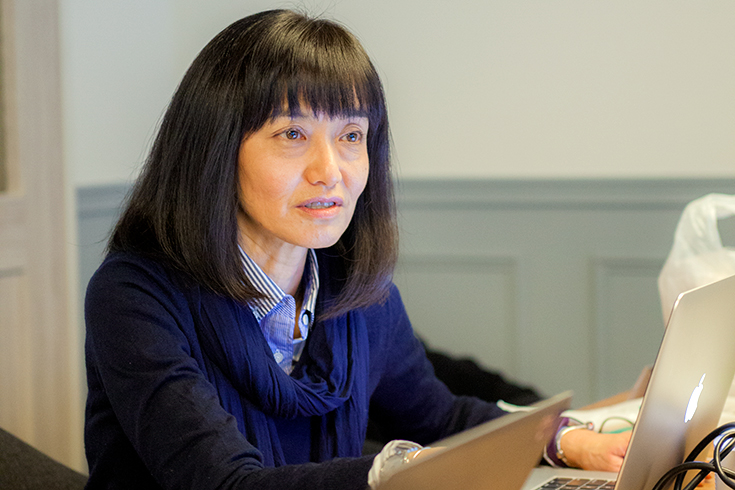
•STEM Education in the U.S.
In Japan, the integration of programming into compulsory education in 2020 is under consideration. Behind this is the idea that school education should include programming in order to foster high-level IT personnel who can serve as the source of industrial competition.
- Is the U.S. far ahead of Japan in that sense?
The U.S. focuses on assessment tests, but seen globally, I feel that the country lags behind in terms of programming education. The U.K. launched programming education two years ago, while Australia has also introduced programming education as part of its STEM education.
“STEM” stands for science, technology, engineering and mathematics. A specific example of STEM education is programming education. Presently, there is a move toward the introduction of a curriculum related to scientific and technological development in compulsory education at elementary school and junior high school. In Japan, it is now being considered to make programming for operating PCs and robots a compulsory subject at elementary school and beyond.
Behind this consideration is the expectation that there will be a considerable shortage of WEB engineers, robot technicians, and other IT-related human resources in the future.
- That’s surprising; we thought that the U.S. would have already begun to take action.
In the U.S., education guidelines vary according to the state. In the case of New Jersey, high school students are required to complete one programming/computer science subject. In Florida, on the other hand, there is a move to treat a programming language as a language subject, like a foreign language subject.
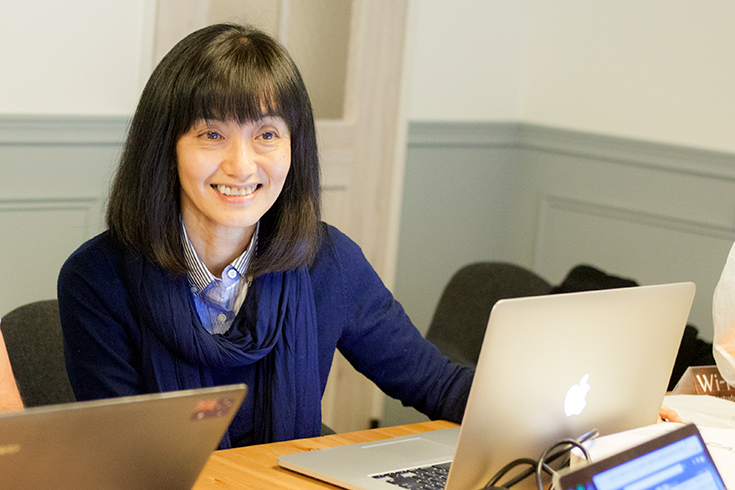
- They’re considering allowing students to select a programming language as one of their language subjects, like Spanish or Italian, aren’t they? Does programming education have much influence on children?
From the standpoint of an educator who teaches students at Bloomfield College, I believe that experiencing robots through programming education is very beneficial. Programming education is evaluated as an excellent tooling in helping children obtain so-called “computational thinking,” which includes logical-thinking skills and problem-solving capability. Nevertheless, in the U.S., the focus is not placed uniformly on programming education, and I feel that’s a pity.
- Children from all over the world compete in the RoboCup. Do you feel that the competition results are affected by whether or not programming education has already been introduced in the contestants' respective countries?
Even in the U.K., computing education began just a few years ago, so I haven’t yet seen a big gap in programming levels by country in the RoboCupJunior competitions.
However, it is evident that children’s levels will be affected by whether or not they have had related experiences from a younger age, although this is not only true of programming. In this regard, I feel a sense of urgency that programming education should be introduced in Japan as soon as possible.
Although I previously said that the U.S. is not an advanced country in terms of programming education, the country provides many opportunities for children to experience robots and programming. For example, at the private elementary school at which I’m involved, second-grade to fourth-grade students are taught programming as part of their science curriculum, using LEGO (Mindstorms). Accordingly, many children discover from a young age how much fun it is to study using robots. In addition, many robot competitions are held in the U.S. There are clear differences between children who compete as teams in such events and children who do not, in terms of their logical thinking, schedule management skill, and problem-solving capability.
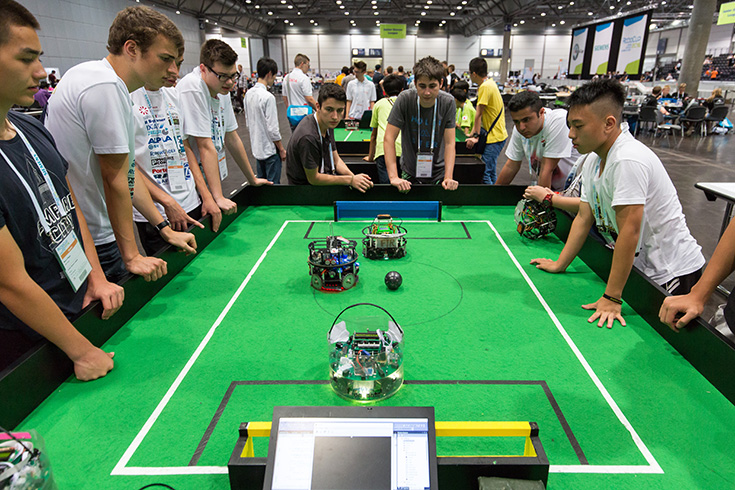
At the soccer league of RoboCupJunior
- It follows, doesn’t it, that in order to increase the number of promising future scientists in Japan, it is necessary to hold many more robot competitions for children, and to increase the number of opportunities for children to enjoy programming competitions.
•Skills Developed through Robot Competitions
In the U.S., the First LEGO League (FLL), targeting children aged 9 to 16, is popular, and in fact the event is held in Japan as well. Since there are many large LEGO communities, there's a lot of information available, which is a big advantage.
Many relevant videos have been uploaded to YouTube, helping children make many friends. Another well-known robot competition is the World Robot Olympiad, which is held in Japan as well. So you can find a robot competition if you look for it.
At the after-school center where I teach, fifth-grade students start programming using Python. These children have already experienced programming, using LEGO robots, when they were in second grade. This means a transition from graphic-based programming called “Drag and Drop” to text coding. Children who have experienced LEGO programming at a robot club before the fifth grade quickly come to understand text coding. I feel this is because they have already acquired computational thinking and skills. If they understand the mechanism of Python programming, they will be taught robot programming using Raspberry Pi, when they enter the sixth grade.
Many children compete in robot games simply because they love robots. I feel that their great enthusiasm spurs their growth. They also acquire the inner strength to “never give up.”
- Is this due to their earnest attitude toward robot competitions and their self-development?
It is difficult for anyone to accelerate their learning without setting specific goals, right? Competing in robot games certainly serves as a good motivation, but what children can learn through the RoboCup is more than just programming. In order to compete in the event, they need to formulate a wide variety of plans to identify what they need to do and by when, make the necessary preparations as scheduled, and put them into action.
If children want to compete in RoboCupJunior, they need to form a team of at least two members. They can't participate alone. This is because robot development is conducted as a team based on cooperation among the team members, and we believe that communication and collaboration among the team members is the most essential factor involved.
When faced with a problem, they need to demonstrate their problem-solving capability. If they are on a bad terms with their team members, they will not be able to overcome any barriers. The RoboCup helps them develop not only robot-related techniques, but also soft skills and social capabilities.
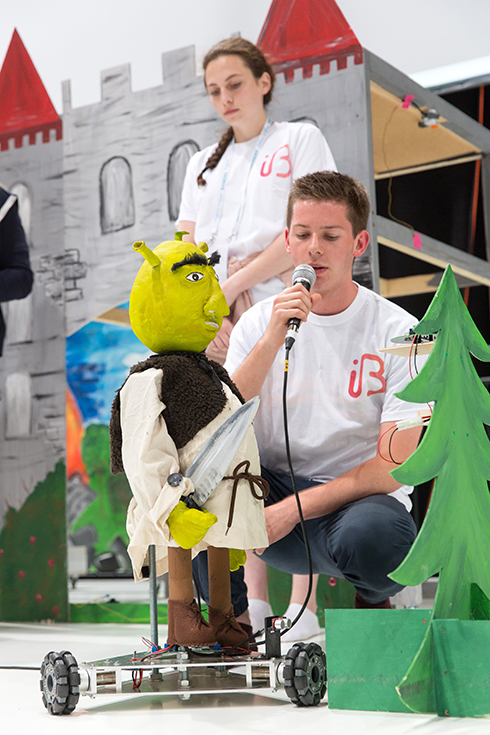
At the “OnStage” league of RoboCupJunior
The RoboCup also helps children improve their presentation skills. At the competition, children are interviewed on, for example, how they organized their development schedules, and why they selected their particular programming. By being asked such in-depth questions, children learn to acquire the capabilities to explain various things, such as the problems they faced and ways to solve them, the points that they found difficult, and the results they obtained by making improvements.
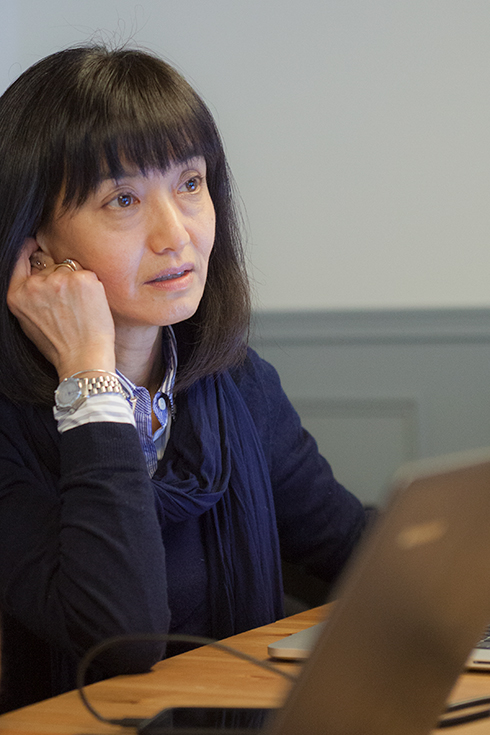
- What’s the key to winning the competition?
The ultimate purpose for children competing in RoboCupJunior is not to win great prizes. The most important thing is to have the experience of “studying new things at a new place of study.” It doesn’t matter whether they win or lose the competition. We believe that if children come to think “We did it!,” or “The other team demonstrated great ingenuity,” or “Their technique was brilliant and we should follow them too,” they will feel motivated to try for their next target.
Moreover, since RoboCupJunior is held in parallel with the RoboCup, it follows that the children will be present at the large venue of the RoboCup and observe top-level techniques demonstrated on a large scale. This will lead the children to feel that they might also be able to do such wonderful things in the future. This is why RoboCupJunior is such a special international competition.
- Are there any special experiences that are only available at the RoboCup?
We have a game in which so-called “SuperTeams” compete. Apart from ordinary teams, the teams consist of two to three teams selected on the spot from different countries. Since this means that children who have met for the first time at the venue constitute a team and aim for victory, it is a perfect opportunity for them to learn about cooperation by interacting with their partners from abroad. While communicating with their teammates across language barriers, children can develop their robot techniques. We believe that these skills that they gain from competing in RoboCupJunior will be useful to them for the rest of their lives.
- Could you give any comments to readers of this interview who might visit RoboCup 2017 Nagoya?
I hope you will ask the children questions.
Any questions are welcome, such as “How did you make this?” or “What technique did you use to do this?”
Since children are eager to show off their works, I’m sure that they'll answer your questions with their eyes glistening, but please ask them in English [laughs].
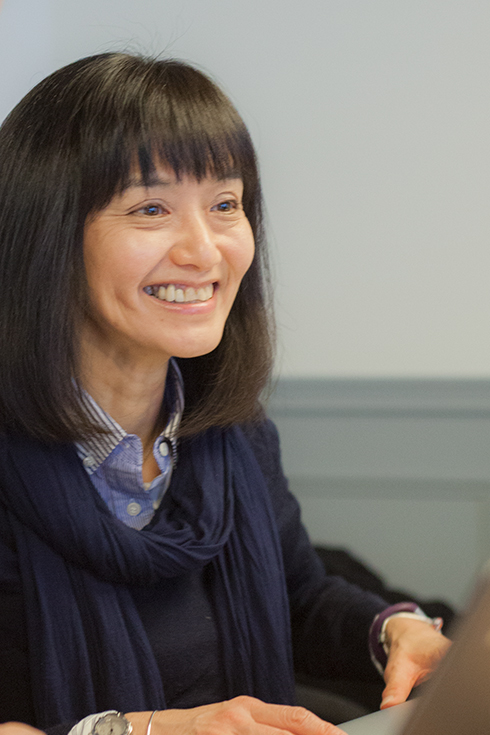
Profile of Prof. Amy Eguchi
RoboCup Federation Vice President representing RoboCupJunior
Professor at Bloomfield College, U.S.





RoboCup2017 Nagoya Secretariat
(Inter Group Corp.)
[E-mail] info@robocup2017.org
[Tel] +81-52-581-3241
Orchid Building 8F, 2-38-2, Meieki, Nakamura-ku, Nagoya, 450-0002 JAPAN